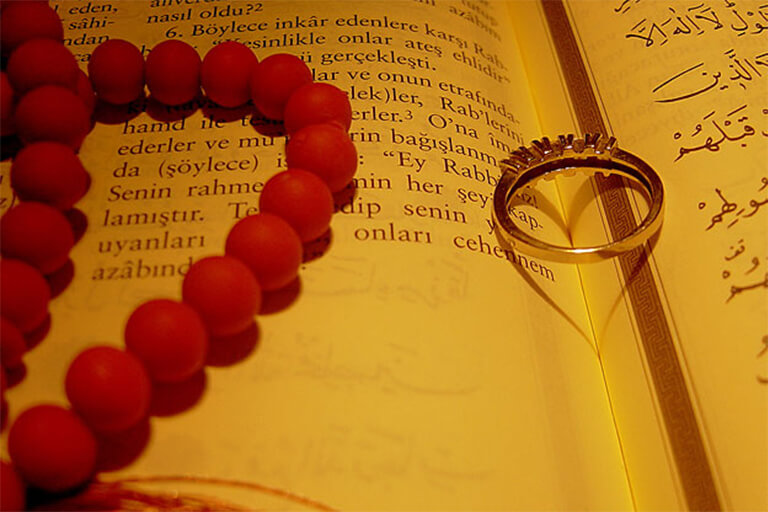Muslim Voices — Women Koran

Audio transcript:
0:00:06:>>ROSEMARY PENNINGTON: Welcome to Muslim Voices. I'm your host, Rosemary Pennington. Today we return to our occasional series, Women in Islam. So far we've heard a controversial Bangladeshi author's views on women's rights, how an architect is working to carve space for herself within Islam and about the special status of Jesus' mother, Mary.
0:00:29:>>UNIDENTIFIED PERSON #1: (Non-English language spoken).
0:00:38:>>ROSEMARY PENNINGTON: Muslim women often take time for study circles away from the mosque when they gather at each other's homes, read and then discuss a chapter of the Koran.
0:00:50:>>UNIDENTIFIED PERSON #1: We sent Noah unto his people saying...
0:00:53:>>ROSEMARY PENNINGTON: I had the chance to sit in on one of those sessions recently, and afterward the women talked about what their faith means to them.
0:01:03:>>UNIDENTIFIED PERSON #1: It means really everything. It helps me to define myself when I go out. You know we have a lot of choices to make every day. We interact with so many different people. And sometimes we don't know what is right for us and what's not right for us. So I have always taken my faith as something where I find guidance, where I go back to make decisions, you know, to decide what to do and what not to do. So yes, for me my faith has been like a guiding - like a guidance for me. When I came here - and like I wasn't wearing hijab back home in Pakistan. When I came here I wanted to grow in my faith. You know I just felt that faith is not something that - it shouldn't be a lip service, you know. It should something be that you feel and that you show it in your actions. And then I realized that hijab is one of the ways in which I can show the people my faith you know through my actions. And really I wanted to grow in my faith and understand really the true spirit.
0:02:17:>>UNIDENTIFIED PERSON #2: I spent a good amount of time without doing the hijab but I was praying all the time (unintelligible). So that helped me - you know pushed me to do it. I didn't want to do it at first because I just wanted to be like everyone else. I was at American University in Cairo and most of the people - you know most of the girls are not you know covering up. And they just want to be like you know like celebrities in just the jeans and whatever. So I wanted to be like that but I didn't really like feel at peace with myself until I mean God guided me and I took the decision and that was it.
0:02:57:>>UNIDENTIFIED PERSON #3: If you define Muslim as a follower of a religion then I'm not that. But if you define Muslim as someone who's trying to peacefully submit to God, be in peace with God, then that's a struggle, a continuous process for me. In that sense, I'm trying to be a Muslim. In the other sense, no. I think maybe when I was younger I would have said that I'm a Muslim, still with the understanding that Muslim means one that submits to God in a peaceful way. I mean in Arabic it's from the same word as salaam which means peace and taslim which means submission. So I was aware of that when I was young. So I don't exactly remember. But over time as - I think maybe more in the U.S. when I realized how religion is defined in people's minds and how there are really different kinds of people who identify as Muslim and I don't necessarily agree with them so I don't want to be labeled in the same pot.
0:04:26:>>UNIDENTIFIED PERSON #4: But this is something for me very important to separate the culture from the awareness of God. And in the culture, every culture tends to misuse power, misuse power against women and against people who have not much power. And belief is not about that thing. So that's just another - I mean you have to separate us. So if there are people who misuse their power to suppress women in the name of Koran, Bible, whatever, that's definitely wrong. But everyone knows that - even the people who do this, I think. I mean, deep down they know this. And this knowledge of deep-down knowing this, this is given by God.
0:05:15:>>ROSEMARY PENNINGTON: You can find other pieces in the "Women in Islam" series at our website muslimvoices.org. This has been Muslim Voices, a production of Voices and Visions in partnership with WFIU public media from Indiana University. Support comes from the Social Science Research Council. Theme music was provided by Animus. You can find us on Twitter and Facebook or subscribe to our podcast in iTunes. There's also a blog at muslimvoices.org.


 IU Global
IU Global